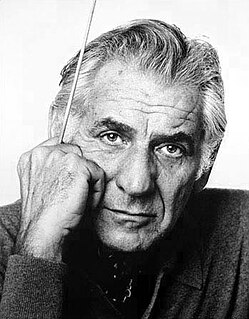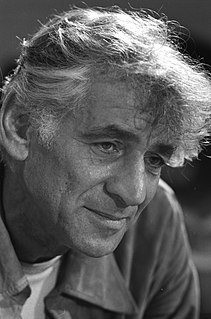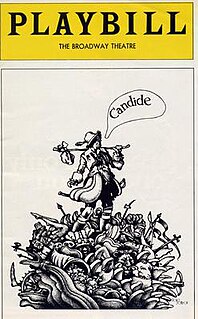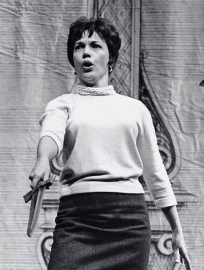
Leonard Bernstein was an American conductor, composer, pianist, music educator, author, and humanitarian. Considered to be one of the most important conductors of his time, he was the first American conductor to receive international acclaim. According to music critic Donal Henahan, he was "one of the most prodigiously talented and successful musicians in American history". Bernstein was the recipient of many honors, including seven Emmy Awards, two Tony Awards, sixteen Grammy Awards including the Lifetime Achievement Award, and the Kennedy Center Honor.

Trouble in Tahiti is a one-act opera in seven scenes composed by Leonard Bernstein with an English libretto by the composer. It is the darkest among Bernstein's "musicals", and one of only two for which he wrote the words and the music. Trouble in Tahiti received its first performance on 12 June 1952 at Bernstein's Festival of the Creative Arts on the campus of Brandeis University in Waltham, Massachusetts, to an audience of nearly 3,000 people. The NBC Opera Theatre subsequently presented the opera on television in November 1952, a production which marked mezzo-soprano Beverly Wolff's professional debut in the role of Dinah. Wolff later reprised the role in the New York City Opera's first staging of the work in 1958. The original work is about 40 minutes long.

Der Rosenkavalier, Op. 59, is a comic opera in three acts by Richard Strauss to an original German libretto by Hugo von Hofmannsthal. It is loosely adapted from the novel Les amours du chevalier de Faublas by Louvet de Couvrai and Molière's comedy Monsieur de Pourceaugnac. It was first performed at the Königliches Opernhaus in Dresden on 26 January 1911 under the direction of Max Reinhardt, Ernst von Schuch conducting. Until the premiere, the working title was Ochs auf Lerchenau.

The Queen of Spades or Pique Dame, Op. 68 is an opera in three acts by Pyotr Ilyich Tchaikovsky to a Russian libretto by the composer's brother Modest Tchaikovsky, based on the 1834 novella of the same name by Alexander Pushkin, but with a dramatically altered plot. The premiere took place in 1890 at the Mariinsky Theatre in Saint Petersburg, Russia.

Candide is an operetta with music composed by Leonard Bernstein, based on the 1759 novella of the same name by Voltaire. The operetta was first performed in 1956 with a libretto by Lillian Hellman; but since 1974 it has been generally performed with a book by Hugh Wheeler which is more faithful to Voltaire's novel. The primary lyricist was the poet Richard Wilbur. Other contributors to the text were John Latouche, Dorothy Parker, Lillian Hellman, Stephen Sondheim, John Mauceri, John Wells, and Bernstein himself. Maurice Peress and Hershy Kay contributed orchestrations. Although unsuccessful at its premiere, Candide has now overcome the unenthusiastic reaction of early audiences and critics and achieved more popularity.

L'heure espagnole is a French one-act opera from 1911, described as a comédie musicale, with music by Maurice Ravel to a French libretto by Franc-Nohain, based on Franc-Nohain's 1904 play ('comédie-bouffe') of the same name The opera, set in Spain in the 18th century, is about a clockmaker whose unfaithful wife attempts to make love to several different men while he is away, leading to them hiding in, and eventually getting stuck in, her husband's clocks. The title can be translated literally as "The Spanish Hour", but the word "heure" more importantly means "time" – "Spanish Time", with the connotation "How They Keep Time in Spain".

Maria Louise Ewing was an American opera singer. In the early part of her career she performed solely as a lyric mezzo-soprano; she later assumed full soprano parts as well. Her signature roles were Blanche, Carmen, Dorabella, Rosina and Salome. Some critics regarded her as one of the most compelling singing actresses of her generation.

Street Scene is an American opera by Kurt Weill (music), Langston Hughes (lyrics), and Elmer Rice (book). Written in 1946 and premiered in Philadelphia that year, Street Scene is based on the Pulitzer Prize-winning 1929 play of the same name by Rice.

The Symphony No. 1 in B♭ major, Op. 38, also known as the Spring Symphony, is the first completed symphonic work composed by Robert Schumann.
Paul Seiko Chihara is an American composer.
Chester Ludgin was an American operatic baritone.

Beverly Wolff was an American mezzo-soprano who had an active career in concerts and operas from the early 1950s to the early 1980s. She performed a broad repertoire which encompassed operatic and concert works in many languages and from a variety of musical periods. She was a champion of new works, notably premiering compositions by Leonard Bernstein, Gian Carlo Menotti, Douglas Moore, and Ned Rorem among other American composers. She also performed in a number of rarely heard baroque operas by George Frideric Handel with the New York City Opera (NYCO), the Handel Society of New York, and at the Kennedy Center Handel Festivals.
Tale for a Deaf Ear is an opera in one act with music and lyrics by Mark Bucci, sung in three languages and based on a story by Elizabeth Enright that appeared in the April 1951 edition of Harper's Magazine. The work was commissioned by Samuel Wechsler for performance at the 1957 Tanglewood Music Festival. The work received an enthusiastic response from an overflow audience of 1,300 when it premiered at Tanglewood on August 5, 1957. The cast was of student artists, of which Billings and Kraft went on to have successful opera careers and Purrington became a nationally known opera director and administrator. The production was directed by the great impresario Boris Goldovsky. The opera received its first professional production at the New York City Opera on April 6, 1958, in a double billing with Leonard Bernstein's Trouble in Tahiti. The production was staged at New York City Center by director Michael Pollock and using costumes and sets designed by Paul Sylbert.
Wendy White is an American mezzo-soprano who has had an active international singing career in operas and concerts since the late 1970s. She has performed annually with the Metropolitan Opera since her debut with the company in 1989, and as of April 2011 has appeared in a total of 499 performances at the Met.
Nell Tangeman was an American mezzo-soprano.

Richard Bernstein is an American bass. He is currently a member of the Metropolitan Opera; 2018–19 is his 24th consecutive season with the company; he sang his 400th Met performance on January 27, 2018 and has been a part of more than 125 international live broadcasts with the company.

Wallis Giunta is an Irish-Canadian mezzo-soprano opera singer and actress performing at leading theatres and opera companies around the world.

Arias and Barcarolles is a 78-minute contemporary classical studio album of music by Leonard Bernstein, performed by Thomas Hampson, Frederica von Stade, Simon Carrington, Neil Percy and the London Symphony Orchestra under the direction of Michael Tilson Thomas. In addition to the song cycle which gives it its name, the album includes the Suite from Bernstein's opera A Quiet Place and the Symphonic Dances from his musical West Side Story. It was released in 1996.

Divertimento, or Divertimento for Orchestra, is a suite of eight orchestral bagatelles by American composer Leonard Bernstein. Completed in 1980 and written to celebrate the centenary of the Boston Symphony Orchestra, it is well-known for featuring the notes B and C in most of its melodic material.













